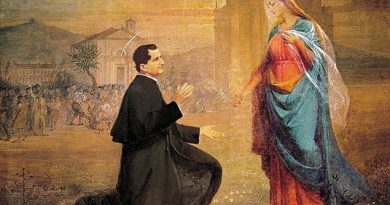Meeting God in the Sacred Scriptures through the Lectio Divina
Lectio Divina, a Latin term which literally means divine reading is an ancient practice that equips us as how to read, meditate on and live the Word of God. History has it that it was the Blessed Guigo the Carthusian, who composed the “most important stages” of this journey of meditating the God’s Word. It needs to be emphasized that the Lectio Divina has nothing to do with following fixed rules. Having said that it does offer phases which will accompany us towards an encounter with a personal message from God to us, through the Bible.
These journey is divided into four phases: the lectio or reading of God’s word; the meditatio, or meditation on that which we have read; the oratio, or prayer which is when we enter in dialogue with God; and finally the contemplatio, or contemplation level in which we let ourselves be led holy thoughts. It is precisely here when we abandon our own thoughts and be prepared to listen to God’s voice, who speaks within us.
Lectio Divina can be prayed individually or in a group. It is obvious that when it is prayed within a group the structure comes into play. Today, we present a way to develop this meditation. It will, for sure, help you grow in your relationship with God.
Before delving deeper into the structure of the Lectio Divina let us taste what its great masters, the saints, have to tell us about it.
Blessed Guigo The Carthusian writes in a Fragment about contemplative life: Reading seeks, meditation finds, prayer asks, contemplation feels. Reading puts as it were whole food into your mouth; meditation chews it and breaks it down; prayer finds its savour; contemplation is the sweetness that so delights and strengthens. Reading is like the bark, the shell; meditation like the pith, the nut; prayer is in the desiring asking; and contemplation is in the delight of the great sweetness. St Gregory the Great said: I beg you, meditate each day upon the words of your creator, discover the heart of God in the words of
God.
The Lectio Divina is a form of reading that isnt’ just intellectual. According to Jordan of Saxony, the first successor to St Dominic, Lectio Divina is a form of reading which isn’t simply intellectual but also and deeply involves loving, prayerful, peaceful and diligent, directed towards a true encounter with God. Read again this word in your heart, remain there in spirit, let it become as sweet as honey on the lips, meditate, live with the word so that the word dwells with you and in you forever.
How essential then it is to feed both the heart and mind so as to progress on God’s path. St Augustine said: We must search for God with all our might in order to find his great gentleness. According to the Carthusian Monk Blessed Guigo II, Lectio Divina has the power to bring nourishment to the mouth by reading … taste it through prayer. Let us never forget what the Fr Timothy Peter Joseph Radcliffe OP, the former Master of the Order of Preachers from 1992 to 2001, had to say about the role of prayer in theology. What, then, is the hallmark of good Theology ? It leads to prayer, adoration, joy and an authentic interior liberty. The last great quote for our encouragement comes from another great Dominican friar, St Thomas Aquinas, the Angelic Doctor, the Common Doctor and the Doctor of humanity. He said: Those who devote themselves to the contemplation of Truth are happiest in this life.
The monks and nuns study the Word of God in their cells too not just in the scriptorium. Each monk’s and nun’s cell is a cloister within a cloister. In one’s room the monk and the nun meets his and her God. In Matthew 6:6 Jesus tells us: But when you pray, go into your room and shut the door and pray to your Father who is in secret; and your Father who sees in secret will reward you. Moreover, we who do not live within a monastery can have the same experience that the monks and nuns engage with God’s Word as well. In fact, St Catherine of Siena reminds us in the few lines that she wrote to one of her followers: Build yourself a spiritual cell, which you can always take with you, and that is the cell of self-knowledge; you will find there also the knowledge of God’s goodness to you. There are really two cells in one, and if you live in one you must also live in the other, otherwise the soul will either despair or be presumptuous; if you dwelt in self-knowledge alone you would despair; if you dwelt in knowledge of God alone you would be tempted to presumption. One must go with the other, and thus you will reach perfection. The Word tells us not only what God is saying to us but also reveals who we are! And, in all this dynamic process, how much it makes sense what Blessed William of St Thierry says: The closed door is not a hiding place but a place of retreat. The cell of our heart is a heaven of peace when it is completely open to God’s transformative action.
After this lengthy introduction let us go through the steps of the Lectio Divina, which, although at times it is arid but its effects are so fruitful!
First, an initial preparation by finding the Scriptural text is called for. It is helpful if one were to find the Gospel passage for the day which is proclaimed at Mass. One can also resort to other Bible passages which touch him and her deeply. Quotes and comments might help us get deeper into the understanding of the text. It is also good to prepare some questions that we might use in your personal reflection. By reading various commentaries attentively we can go straight to the principal points that have been knocking at our heart’s door. Following this exercise we can start with the proper prayer.
Second, after finding a good posture so that we can avoid useless distractions and be more ready to concentrate on the Scripture portion we are going to pray by. In order to bless our human limited efforts it is essential that we do the sign of the Cross.
Third, as initial Prayer, we can initiate the Lectio Divina by a beautiful prayer to the Father to send His Holy Spirit upon us to illumine us along the way. A spontaneous prayer like the following surely helps start this most beautiful journey. My Lord, in your presence I want to prepare my heart for this moment of prayer. Send your Holy Spirit to enlighten me and open my mind and heart to everything You want to tell me today. Thank you Lord, for nourishing me with your Word.
Fourth, after finishing our prayer at the beginning we then move on the actual Scripture reading. It is not important if it is that day’s Gospel or any other different text we might want to choose. What is crucial is that we read slowly so that we can clearly understand what is written in that biblical text.
Fifth, at this stage it can be helpful if we resort to that commentary piece or reflection we have found as a preparation for this text. Such a reading can help us get deeper into the text and, in the long run, prepares us to listen to God’s voice.
Sixth, just after this reading comes straightaway our personal meditation. As we pause and let complete silence entering in us, the silence in which the Holy Spirit can really work in and through us, we start seeing our personal lives in the light of the Scriptural reading we are praying on. Some questions that can help us at this point are the coming ones: What is the Gospel I just read is telling me? In what way is it enlightening my life? Which virtues of Jesus am I finding in this text? What is the message God is conveying to me through this passage?
Seventh, after this great moment of grace we thank God for the insights the Father is giving to us in the Spirit to follow closely His Son and our Brother Jesus. May be the Father has shown us different way of being responsible not, for instance, through anxiety and arrogance but through love, patience and determination. This interiorisation moment of the Word in us is really a blessing because it is here that real changes starts happening in our lives. May be, at this moment, we decide to do things differently because, for the first time, we start letting God be God in our lives. Even in the minutest of the decisions we need to take for us and for our loved ones. Here, also, we can also present to Him our intentions. This moment is our loving response for the transformation process that is happening to us by contemplating His life-giving Word.
Eighth, we conclude our Lectio by a thanksgiving prayer. Some suggest that we end the Lectio Divina by consecrating ourselves to Mary and asking wholeheartedly for her maternal intercession. Such a way of concluding makes perfect sense because it is Mary who takes us to her Son Jesus. Then follows the Sign of the Cross.
What emerges clear from this exercise is that the Lectio Divina is not a rigid structure. However, it helps us alot to grow in our relationship with God through his revealed Word. Let us be encouraged and led by this beautiful text, taken from Pope Francis’ apostolic letter on the proclamation of the Gospel in today’s world, Evangelii Gaudium, numbers 152-153:
There is one particular way of listening to what the Lord wishes to tell us in his word and of letting ourselves be transformed by the Spirit. It is what we call lectio divina. It consists of reading God’s word in a moment of prayer and allowing it to enlighten and renew us. This prayerful reading of the Bible is not something separate from the study undertaken by the preacher to ascertain the central message of the text; on the contrary, it should begin with that study and then go on to discern how that same message speaks to his own life. The spiritual reading of a text must start with its literal sense. Otherwise we can easily make the text say what we think is convenient, useful for confirming us in our previous decisions, suited to our own patterns of thought. Ultimately this would be tantamount to using something sacred for our own benefit and then passing on this confusion to God’s people. We must never forget that sometimes “even Satan disguises himself as an angel of light” (2 Cor 11:14).
In the presence of God, during a recollected reading of the text, it is good to ask, for example: “Lord, what does this text say to me? What is it about my life that you want to change by this text? What troubles me about this text? Why am I not interested in this? Or perhaps: What do I find pleasant in this text? What is it about this word that moves me? What attracts me? Why does it attract me?” When we make an effort to listen to the Lord, temptations usually arise. One of them is simply to feel troubled or burdened, and to turn away. Another common temptation is to think about what the text means for other people, and so avoid applying it to our own life. It can also happen that we look for excuses to water down the clear meaning of the text. Or we can wonder if God is demanding too much of us, asking for a decision which we are not yet prepared to make. This leads many people to stop taking pleasure in the encounter with God’s word; but this would mean forgetting that no one is more patient than God our Father, that no one is more understanding and willing to wait. He always invites us to take a step forward, but does not demand a full response if we are not yet ready. He simply asks that we sincerely look at our life and present ourselves honestly before him, and that we be willing to continue to grow, asking from him what we ourselves cannot as yet achieve.
Fr Mario Attard OFM Cap





